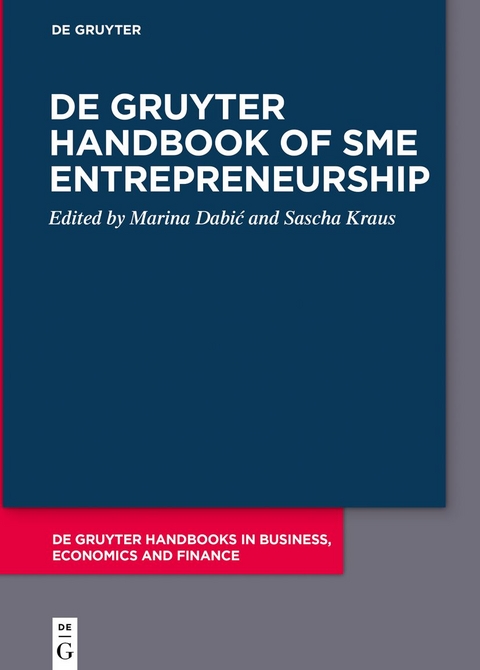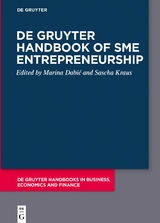De Gruyter Handbook of SME Entrepreneurship
De Gruyter (Verlag)
978-3-11-074752-2 (ISBN)
"A small business is not a little big business."
Small- and medium-sized enterprises (SMEs) are considered the engines of worldwide economies and the main sources of job creation. Management in these companies is different from management in larger/older enterprises with their already established concepts and instruments. In view of the high importance of SMEs in emerging, developing and developed economies worldwide, the De Gruyter Handbook of SME Entrepreneurship investigates the underlying mechanisms and practices of management within these companies with a focus on entrepreneurship, growth and innovation.
It argues that it is time for a dedicated theory of "SME Entrepreneurship" to emerge. Entrepreneurial thinking and behavior in SMEs must be differentiated from that of start-ups and large companies. On the other hand, it also explores the different entrepreneurship manifestations that exist within a widely heterogeneous group of SMEs.
The handbook provides a theoretical framework in which to understand, compare and contrast the complexity of SMEs in both domestic and international processes and addresses the strengths, achievements, and challenges of entrepreneurship in SMEs.
lt;p>Marina Dabic is Full Professor of Entrepreneurship and International Business at University of Zagreb, Faculty of Economics and Business, Croatia. She prepared a background report for OECD/EC HEinnovate for Croatia. Her papers have appeared in a wide variety of international journals, including the Journal of International Business Studies, the Journal of World Business, the Journal of Business Research, Technological Forecasting and Social Change, Small Business Economics, the Small Business Management Journal, the International Journal of Human Resource Management, IEEE- Transactions on Engineering Management, Organizational Dynamics, and many others. Prof. Dabic is Associate Editor of Technological Forecasting and Social Change, Department Editor for IEEE - Transactions on Engineering Management, and Associate Editor for Technology in Society. She is also Member of the IEEE-TEMS Board of governors.
Sascha Kraus is Full Professor of Management at the Free University of Bozen-Bolzano. He holds a doctorate in Social and Economic Sciences from Klagenfurt University, Austria, a Ph.D. in Industrial Engineering and Management from Helsinki University of Technology and a Habilitation (Venia Docendi) from Lappeenranta University of Technology, both in Finland. Previously, he held Full Professor positions at Utrecht University, The Netherlands, the University of Liechtenstein, École Supérieure du Commerce Extérieur Paris, France, and at Durham University, United Kingdom. He also held Visiting Professor positions at Copenhagen Business School, Denmark and at the University of St.Gallen, Switzerland, and was EECPCL Participating Professor at Harvard University. His main research areas are strategy, internationalization, entrepreneurship and innovation. He is the author of more than 100 academic articles, his research being published in journals such as: Global Strategy Journal, International Journal of Management Reviews, Journal of Business Research, Journal of Product Innovation Management, Journal of World Business, and Long Range Planning. He is Associate Editor of the journals Review of Managerial Science, Journal of Small Business Management, Journal of Innovation and Knowledge, and editorial board member of a number of general management and entrepreneurship/small business journals.
Introduction
Section 1: Theories of SME Entrepreneurship
Section 2: Levels of analysis (micro, meso and macro)
Policy action on national or regional level
Risk and challenges in SMEs
SMEs and regional development
Entrepreneurial ecosystems
Governance of SMEs
Innovation in SMEs
Marketing/branding in SMEs
Section 3: Education
Responsible forms of entrepreneurial education
Developing responsible SME competencies
Entrepreneurial education
Ethical research questions in SME entrepreneurship
Section 4: Processes in SMEs
Value chain in SMEs
Decision processes in SMEs
Digitilization of SMEs/Technology and AI in SMEs
Growth of SMEs/start-ups
Internationalization of SMEs/Entry modes
Business models in SMEs
Section 5: Entrepreneurial capital of SMEs
Intellectual capital in SMEs
Professional bodies/leadership
Social capital in SMEs
Knowledge sharing/knowledge management in SMEs
Talent development in SMEs
Intellectual property in SMEs
Section 6: SMEs and stakeholders
SMESs and university U-I interactions
Business angels and financial support for SMEs
Social SMEs
Ethnic groups and minorities in SMEs
| Erscheinungsdatum | 11.10.2023 |
|---|---|
| Reihe/Serie | De Gruyter Handbooks in Business, Economics and Finance |
| Zusatzinfo | 31 b/w and 36 col. ill., 85 b/w tbl. |
| Verlagsort | Berlin/Boston |
| Sprache | englisch |
| Maße | 170 x 240 mm |
| Gewicht | 1300 g |
| Themenwelt | Wirtschaft ► Betriebswirtschaft / Management ► Unternehmensführung / Management |
| Schlagworte | Entrepreneurship • KMU • Small and Medium-sized Enterprises • Small Business Management • SME entrepreneurship • SME innovation • SME management • Unternehmerschaft |
| ISBN-10 | 3-11-074752-9 / 3110747529 |
| ISBN-13 | 978-3-11-074752-2 / 9783110747522 |
| Zustand | Neuware |
| Informationen gemäß Produktsicherheitsverordnung (GPSR) | |
| Haben Sie eine Frage zum Produkt? |
aus dem Bereich




